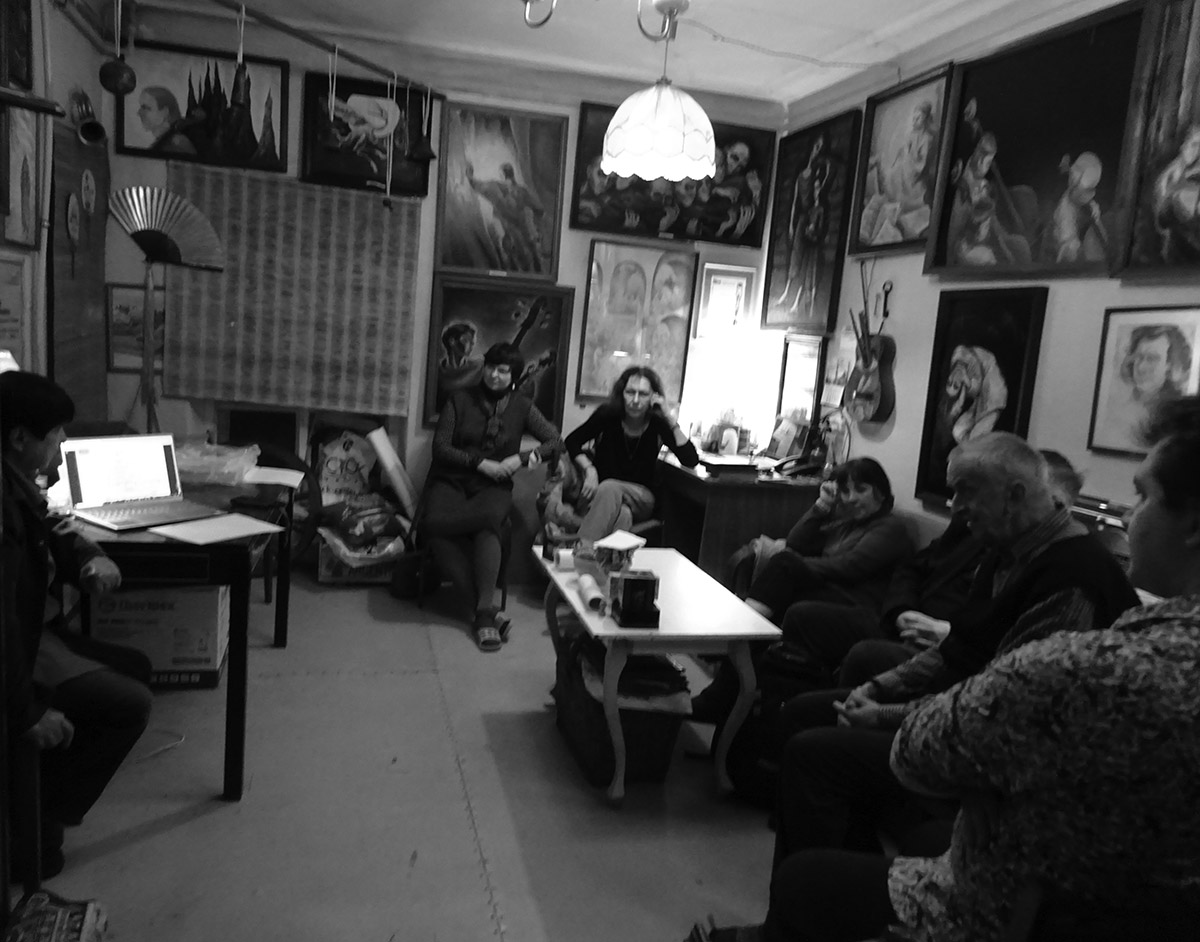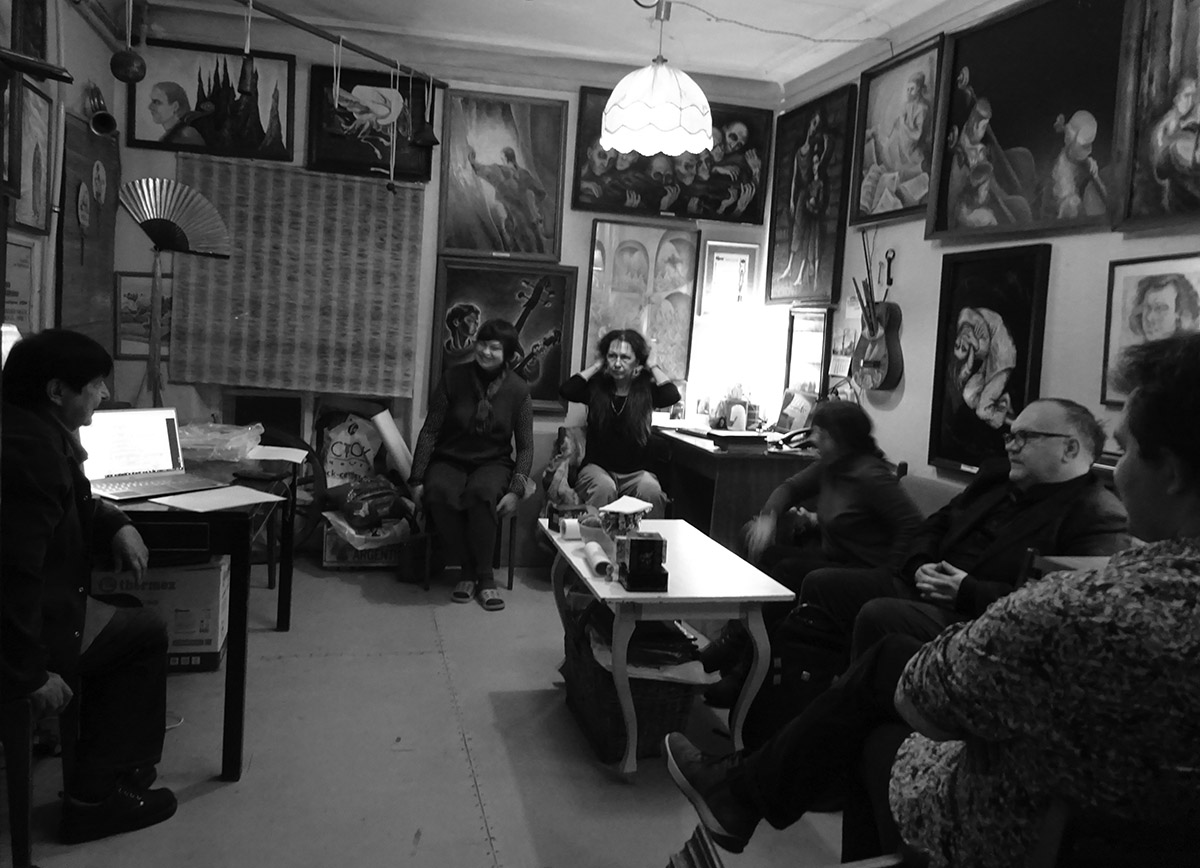
Back in St. Petersburg by the beginning of November 2021, AB’s editors immediately found many opportunities to assess current attitudes toward culture. At the 5th Cultural Congress, in which we took part, we encountered the opinion that the era of the cult of globalism is already over and has given way to a new era of recognizing the need for attention to various individual phenomena, on the scale on which a person really exists. The topics of our sections overlapped: “Cultural Industries” and “International Research and International Cooperation in Culture,” where we presented our views on “culture as a model and vector of evolution” and on the preservation of cultural heritage based on our work with the poetic archive of Anna Alekseeva (see AB 30).
Some reflections on the sections: in some of the lectures one could feel the inertia of conformity to the old world, and in some, on the contrary, the recognition that a new time is already coming by necessity — for those, at least, who are determined to truly belong to the culture. It is not enough to rely on abstract globalism, which removes individuals’ personal responsibility for their own development and leaves a void in society, which then fills with fragmented interests and values. Structures called upon to serve culture should not use their powers for this.
Therefore, it seemed natural that after the congress a strong desire remained to continue the conversation about culture in an even more vivid form — especially since the congress itself shifted to a remote form at the last moment. Indeed, a very lively dialogue took place on November 18 in our editorial office on Apraksin Lane, thanks to Tamara Viktorovna Partanenko’s seminar on L.N. Gumilyov’s theory of ethnogenesis. The seminar formed a successful precedent for the activities of our club Boogie-Woogie? -Ῥῆμα (Rhema).

Boogie-woogie is a rock-and-roll term that implies an active mutual exchange. Ῥῆμα is a Greek term for the action of utterance. The latter term was suggested to us by our author, philosopher Alexander Lvov, trying to characterize what happens at our seminars. By the end of the evening, philosopher Andrei Patkul looked at his watch and couldn’t believe the three hours dedicated to the event had flown by so quickly. Yes, we managed to elude the influence of time. Among the participants, who included both professional philosophers and supporters of philosophy representing other specialties and manners of life, namely the kind of polyphonic state of interaction transpired about which we can confidently say that yes, that was Boogie-woogie ῥῆμα.
The seminar participants’ additional interest was sparked by Partanenko having personally known Gumilyov, whose lectures she unexpectedly began to attend while still a psychology student. As a result, Partanenko switched to philosophy and began to study and apply Gumilyov’s theory, primarily in examining the relationship between cultures. Although Partanenko became a successful expert on Russian-French relations, her desire to make Gumilyov a central source in her work led to difficult consequences for her academic career at a time when Gumilyov himself was officially in disgrace.

Partanenko spoke about the reasons for this disgrace, connected with Gumilyov associating the evolution of civilization with the effect of cosmic radiation at certain moments striking the Earth like a whip. Because of this view, unacceptable for the Marxist-materialist intellectual environment of the Soviet Union, Gumilev faced serious professional restrictions. However, in parallel, he achieved great popularity among readers due to his lively style and the scope of his perspective, combining history, geography, biology, psychology and other disciplines.
The former student remembers Gumilyov as a brilliant lecturer who taught without notes and who, in an uncharacteristic way for Soviet times, asked questions directly to students, asking for their opinions. This approach at first embarrassed Partanenko but eventually contributed to her fascination with his personality and thought.
The scholar N.V. Serov, who attended the seminar, also recalled his personal contact with Gumilev at lectures in the 60s. Gumilyov impressed him as a kind person who spoke with students as equals. Serov, who eventually also took up syncretic thought in his own way, wrote an article comparing Gumilyov’s theory with Confucian philosophy, establishing an analogy between the concepts of “biosphere” for Gumilyov and “heaven” for Confucius.
Those present at the seminar were interested in the relevance of Gumilyov’s thought today:
– Was Gumilyov really ahead of his time, as Partanenko believes, anticipating recent discoveries about space?
– Or does Gumilyov remain an antiquated anachronism, whose ideas no one is developing?
– On the basis of what information or influences did Gumilev build his theory? Or did he invent it himself?
– Was what Gumilyov considered a discovery actually more a new presentation of thoughts about evolution, characteristic of Darwin’s century, while including other ideas about the mechanism of “passionarity,” the readiness for self-sacrifice, which he considered the driver of evolution?
– Did Gumilev prove the existence of this mechanism in the form that he describes, or does his system depend solely on his personal intuition?
– Does his system contain arbitrary distortions, even if its more cosmic part is treated metaphorically?
– Does his theory too strongly equate militancy with evolution, paying less attention to other manifestations of human nature, for example, in culture, peacemaking, dialogue?
– Do ethnic groups really exist as rigid, unchanging categories, if people demonstrate an ability to freely adapt to new geopolitical contexts?
– Is the tendency to adapt a sign of the strength or weakness of an individual or ethnic group?
– Is it possible to compare Gumilyov’s ideas about the energy of an ethnic group with, for example, what Machiavelli said about the people’s inherent energy, which the “prince” absorbs into himself?
– Or is the power of a ruler always illusory compared to more essential factors in the evolutionary state of a people?
– Was Gumilyov’s desire to think in ideal categories laudable or doomed?
All these and many other questions raised during the conversation remain open for further discussion.


Speak Your Mind